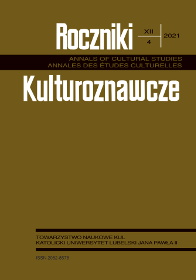Recovery of the Father Figure at the Margins of the Franciscan Middle Ages
Abstract
There are three arguments that we have tried to discuss with respect to the general assumption that the modern age distances itself from the medieval age in general and the Franciscan age in particular, not because it is authoritarian (according to the typical historiographic cliche, which depicts a son who rebels against his father) but because it wants to embed the interpretation of being no longer in the will of God and man, but in parameters inspired by the primacy of reason, autonomous and self-sufficient – the irrefutable tribunal of truth. It is argumented in the first thesis that the “father”, as a figure of creative will to some extent, seems to be the most representative figure of “Franciscan thinking”. The second thesis is that the father fulfils this will not by taking, but by giving, not by dominating but by serving. The third thesis is that the father incarnates in an extraordinary way the responsibility, ascribed to his own individuality, but at the same time open to others: family, group, nation, world. In short, the Franciscan seems to look at the father as the most complete expression of his philosophical-theological perspective, in that he represents the one who gives all that he is and has, with full responsibility. Given that responsibility, voluntarism appears as an attitude in which creatures exist not because they have a right to be, but because they are wanted with radical disinterestedness.
References
Arendt, Hanna. La vita della mente. Tradotto da Giorgio Zanetti, Bologna, Il Mulino, 1987.
Benedetti, Marina. “‘Ma qual è la vera letizia’. Realtà e metamorfosi di Francesco”. In Francesco da Assisi. Storia, arte, mito, a cura di Marina Benedetti e Tomaso Subini, 29–40. Roma: Carocci, 2019.
Blumstein, Daniel T. The Nature of Fear. Survival Lessons from the Wild. Cambridge, MA: Harvard University Press, 2020.
Brague, Rémi. Il futuro dell’Occidente. Tradotto da Adriana Soldati. Milano: Rusconi, 1998.
Cantarella, Eva. Come uccidere il padre. Genitori e figli da Roma a oggi. Milano: Feltrinelli, 2020.
Cavaciuti, Santino. Libertà e trascendenza. Soveria Mannelli: Rubbettino, 2018.
de Dhaem, Armaury Begasse, “Scriptura sive theologia o come Dio viene all’uomo. Il proprium di San Bonaventura secondo Étienne Gilson ed Emmanuel Falque”. In Trilogia bonaventuriana, a cura di Carmelo Pandolfi e Rafael Pascual, 639–84. Roma: IF Press, 2020.
Falque, Emmanuel. Saint Bonaventure et l’entrée de Dieu en théologie. Paris: Vrin, 2000.
Forthomme, Bernard. Il canto del corpo ardente. La stimmatizzazione di san Francesco di Assisi. Padova: Messaggero, 2012.
Frugoni, Chiara. Un presepio con molte sorprese. San Francesco e il Natale di Greccio. Roma: Mauvais Livres, 2020.
Givone, Sergio. Metafisica della peste. Colpa e destino. Torino: Einaudi, 2012.
Gregory, Tullio. Mundana sapientia. Forme di conoscenza nella cultura medievale. Roma: Edizioni di Storia e Letteratura, 1992.
Heidegger, Martin. I problemi fondamentali della fenomenologia. Genova: Il Melangolo, 1988.
Heidegger, Martin. Introduzione alla metafisica. Milano: Mursia, 1986.
Heidegger, Martin. La questione della cosa. La dottrina kantiana dei principi trascendentali. Napoli: Guida, 1989.
Lenzi, Massimiliano. “Il nulla nelle Confessioni di Agostino tra creazione e conversione”. In Discussioni sul nulla tra medioevo ed età moderna, a cura di Massimiliano Lenzi e Alfonso Maierù, 21–36. Firenze: Olschki, 2009.
Le Goff, Jacques. San Francesco d’Assisi. Tradotto da Lisa Baruffi e Amedeo De Vincentiis. Bari: Laterza, 2002.
Malaguti, Maurizio. La metafisica del volto. Una lettura di Dante. Milano: Edizioni Biblioteca Francescana, 2020.
Merton, Thomas. Gli abissi infiniti del cielo. Tradotto da Chiara Benedetti. Brescia: Queriniana, 2019.
Morin, Edgar. La fraternità perché? Resistere alla crudeltà del mondo. Tradotto da Nicola Manghi, Roma: Ave, 2019.
Paciocco, Roberto. “‘Sub iugo servitutis’. Francesco, i Francescani e la ‘militia Christi’”. In “Militia Christi” e Crociata nei secoli XI-XIII. Atti della undecima Settimana internazionale di studio, Mendola 28 agosto – 1 settembre 1989, 699–715. Milano: VeP, 1992.
Siniscalchi, Paolo. “La creatio ex nihilo nel pensiero dei più antichi scrittori cristiani”. In Discussioni sul nulla tra medioevo ed età moderna, a cura di Massimiliano Lenzi e Alfonso Maierù, 3–20. Firenze: Olschki, 2009.
Strummiello, Giuseppina. Il logos violato. La violenza nella filosofia. Bari: Dedalo 1991.
Thompson, Augustine. Francesco d’Assisi una nuova biografia. Bari: Edizioni di Pagina, 2016.
Tresmontant, Claude. La Christologie du B. Jean Duns Scot, l’Immaculée Conception et l’avenir dell’Eglise. Note complementaire à propos du peché originel. Paris: François-Xavier de Guibert, 1996.
Vattimo, Gianni. La vita dell’altro. Bioetica senza metafisica. Napoli: Marco Costantino, 2006.





